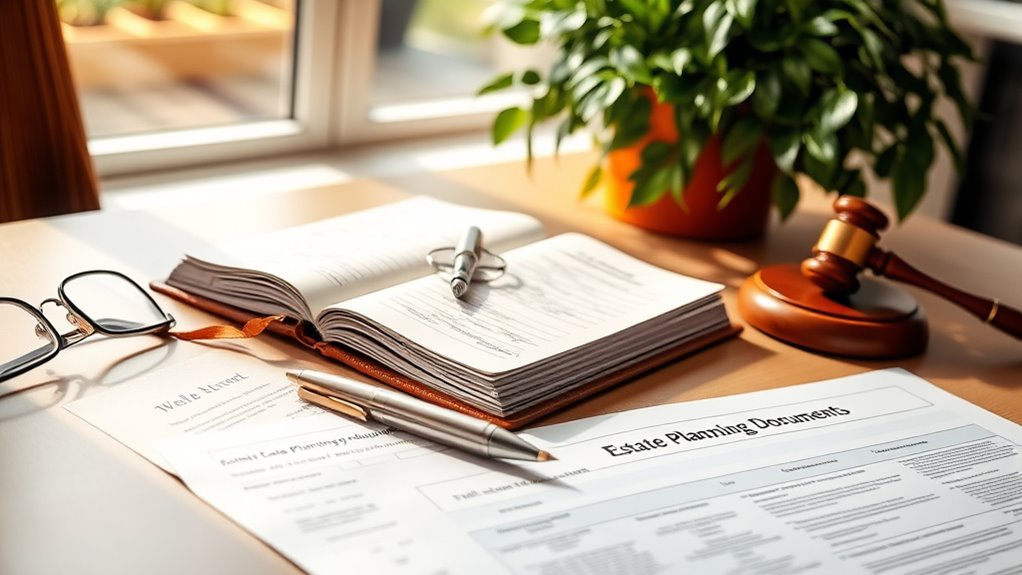Estate planning helps you protect your assets and ensure your wishes are followed after you pass or become incapacitated. Key documents include wills, which specify asset distribution, and trusts, which can manage and protect assets during your lifetime and beyond. Power of attorney appoints someone to make decisions for you if you’re unable, while beneficiaries and guardians are designated to handle your estate and care for dependents. To learn how all these pieces fit together, keep exploring the essential aspects of estate planning.
Key Takeaways
- Estate planning involves creating legal documents like wills, trusts, powers of attorney, and healthcare directives to manage assets and care decisions.
- Wills specify how assets are distributed after death, while trusts can help avoid probate and provide ongoing asset management.
- Powers of attorney appoint trusted individuals to handle financial or medical decisions if you become incapacitated.
- Regularly update and organize your estate documents and asset inventory to ensure they reflect current circumstances.
- Understanding state-specific laws and consulting professionals ensures your estate plan is legally valid and aligned with your goals.
Understanding the Key Documents in Estate Planning

Understanding the key documents in estate planning is essential to ensuring your wishes are followed and your loved ones are protected. Wills are the foundation of how your assets are distributed after your death. They also allow you to name guardians for minor children or dependents, avoiding court-appointed guardianship. However, wills don’t control all assets, like jointly held property or life insurance. Trusts, especially revocable living trusts, manage property during your lifetime and after death, helping you avoid probate and keep matters private. Powers of attorney give someone authority to handle financial or medical decisions if you’re unable, and they stop at your death. Advance directives specify your healthcare preferences, while letters of instruction guide your loved ones with personal wishes, making estate management smoother and aligned with your values. Being aware of the legal processes involved in estate planning can further ensure your estate is handled according to your wishes. Additionally, understanding Louisiana alimony laws can be important if your estate planning involves spousal support arrangements. Incorporating proper estate documentation ensures clarity and reduces the potential for disputes among heirs.
How to Assess and Organize Your Estate Assets

To effectively plan your estate, you need a clear picture of what you own and how much it’s worth. Start by creating a thorough inventory of your assets, including real estate, personal belongings, financial accounts, and business interests. Then, assign fair market values to each item using professional appraisals or market data. This helps you understand your total estate value. Additionally, understanding asset valuation methods can improve the accuracy of your property assessments. For example, using market data or appraisal techniques ensures more precise valuations. Finally, identify and document any liabilities like mortgages, debts, and medical expenses to determine your net worth.
Here are three key steps to organizing your estate assets:
- Compile all relevant documents—titles, deeds, statements, and policies.
- Maintain detailed records of ownership, location, and value.
- Regularly review and update your asset list to reflect changes and new valuations.
The Role of Trusts and Their Types

Trusts play an essential role in estate planning by allowing you to control and manage assets for your beneficiaries beyond your lifetime. They help avoid probate, making asset distribution faster and private. Trusts also protect assets from creditors and can reduce estate and gift taxes. You can set up trusts to manage assets for minors, disabled individuals, or specific purposes like funding education or healthcare. There are different types based on creation and timing, such as living (inter vivos) trusts created during your lifetime and *testamentary* trusts established through a will after death. Revocable trusts offer flexibility, allowing you to modify them, while irrevocable trusts provide stronger protections and tax benefits. Specialized trusts, like Crummey or dynasty trusts, serve specific needs, ensuring your assets are managed precisely as you intend. Additionally, diverse designs in trust structures can enhance the security and effectiveness of your estate plan. Incorporating trusts in estate planning can offer tailored solutions that suit your unique circumstances and goals. Understanding the various trust types available can help you select the most appropriate structure for your estate.

Power of Attorney (POA) is a legal tool that lets you appoint someone you trust to handle your financial, legal, or medical decisions if you’re unable to do so yourself. It guarantees your affairs are managed smoothly during incapacity or convenience, avoiding court intervention. Without a POA, courts may need to appoint guardians or conservators, which can cause delays. Here’s what it involves:
A POA ensures your affairs are managed smoothly if you’re unable to act yourself.
- Types of POA: Choose from general, medical, limited, durable, or springing, depending on your needs.
- Agent’s Role: Your agent must act within the scope of authority, handling tasks like managing accounts or making healthcare decisions.
- Legal Requirements: Requirements vary by state, often involving notarization, witnesses, and the ability to revoke the POA anytime you have capacity. Creating a POA properly ensures it will be recognized and enforceable when needed. Additionally, understanding the types of POA available can help you select the most appropriate form for your situation. Recognizing the cultural significance of legal documents can also influence how you approach estate planning to ensure compliance and understanding across diverse communities. Being aware of legal document standards can further ensure your POA complies with all necessary legal criteria.
Choosing Beneficiaries and Guardians for Your Estate

Choosing beneficiaries and guardians is a crucial step in estate planning because it guarantees your assets and loved ones are cared for according to your wishes. Naming beneficiaries legally designates who will receive your assets, helping you avoid intestacy laws. Selecting guardians is vital for minors or incapacitated dependents, ensuring they receive proper care aligned with your values. Guardianship affects personal care and financial management of inheritance, so choose individuals with responsible decision-making, strong ethics, and stability. Regularly update these designations as circumstances change. Document guardian nominations clearly in wills or trusts, and consider backup guardians. Proper legal procedures, often with an attorney’s help, ensure your choices are enforceable. Clear designations reduce family conflicts and protect your loved ones’ future. Regularly reviewing and updating beneficiary and guardian designations is essential to reflect life changes and maintain the effectiveness of your estate plan. Additionally, understanding estate planning laws can help you navigate complex legal requirements and ensure your estate plan is comprehensive. Staying informed about legal developments, especially those related to wills and trusts, can be crucial for maintaining the validity of your estate plan. Incorporating state-specific regulations into your planning can further safeguard your intentions and ensure compliance.
Frequently Asked Questions
How Often Should I Review and Update My Estate Plan?
You should review your estate plan every three to five years to keep it current and aligned with your goals. Life changes like marriage, divorce, birth, or significant asset shifts mean you need updates sooner. Regular reviews help avoid outdated documents that could lead to probate issues or assets going to unintended beneficiaries. Stay proactive to guarantee your estate plan reflects your wishes and complies with current laws, reducing potential legal complications.
What Are the Costs Associated With Setting up an Estate Plan?
When setting up an estate plan, you’ll find costs vary based on complexity. Basic wills start around $150 to $1,500, while living trusts range from $1,000 to $5,000. More inclusive plans with multiple documents can cost $1,000 to over $5,000. Hiring an attorney hourly might be $250 to $450, or you can choose flat fees or online services for simpler needs. Planning ahead helps control expenses.
Can I Create an Estate Plan Without a Lawyer?
Think of creating an estate plan like assembling a puzzle—you can do it yourself if you have the right pieces. Online services like LegalZoom or Quicken WillMaker let you craft wills and trusts without a lawyer, following clear instructions. You can also draft power of attorney and living wills at home. Just make certain you understand your state’s laws and carefully review your documents to make sure everything fits perfectly.
How Do Estate Taxes Impact My Estate Planning?
Estate taxes substantially impact your estate planning because they reduce the amount your heirs receive if your estate exceeds the exemption limit. You need to strategize with gifting, trusts, or other methods to minimize taxes owed. By planning ahead, you can protect more of your estate from hefty tax rates, especially for larger estates, ensuring your assets are preserved for your loved ones.
What Are Common Mistakes to Avoid in Estate Planning?
You’d hate to leave family conflicts or delays looming over your loved ones. To avoid this, regularly review and update your estate plan after major life changes. Be careful with asset designations, choose trustworthy executors, and plan for liquidity and final arrangements. Don’t overlook digital assets or the need for durable incapacity documents. Taking these steps guarantees your wishes are honored smoothly, reducing stress and uncertainty for those you care about most.
Conclusion
By understanding the key estate planning documents, you’re laying a solid foundation for your future. Think of your estate plan as a map guiding your loved ones through life’s twists and turns. Stay organized, choose your beneficiaries wisely, and update your plan as life changes. Remember, neglecting this process is like leaving your future to chance — don’t leave your loved ones lost in the dark. Take action today to secure peace of mind tomorrow.









